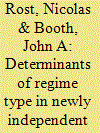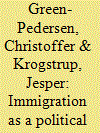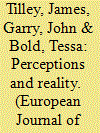|
|
|
Sort Order |
|
|
|
Items / Page
|
|
|
|
|
|
|
| Srl | Item |
| 1 |
ID:
083265


|
|
|
|
|
| Publication |
2008.
|
| Summary/Abstract |
Abstract. Since 1945, newly independent states have differed from longer lived states in their greater risk of violent conflict and more challenging environment for democratisation. The authors of this article theorise that certain economic, demographic, violence-related and external factors should affect the regime type (level of democracy versus autocracy) in newly independent states. Examining exclusively newly independent states that have undergone major political transitions allows one to determine factors favouring democracy over autocracy under such volatile circumstances. The authors test several hypotheses, using cross-sectional and cross-sectional time-series analyses, and find that economic development elevates the level of democracy in new states. Cultural heterogeneity has no effect, but external factors play an important role. Genocide and politicide reduce democracy, while civil wars have the opposite effect. These findings prove robust to alternative measurements of the dependent variable and alternative model specifications
|
|
|
|
|
|
|
|
|
|
|
|
|
|
|
|
| 2 |
ID:
083263


|
|
|
|
|
| Publication |
2008.
|
| Summary/Abstract |
Abstract. Are globalisation and regional integration producing a postnational identity among a wide variety of publics? Using the World Values Surveys (WVS), this article shows that there is a global pattern in public attitudes toward supranational identity: the younger the respondent, the more supranational. Yet a life-cycle effect, as opposed to a generational one, underlies this pattern. A multilevel analysis confirms this age effect on supranational identification in 43 countries covered in the recent wave of the WVS, but provides little support for the idea that a country's integration into the global economy and world society promotes supranational attachments among mass publics, especially youths. Regional integration and globalisation appear either complementary or contradictory to this identity shift, depending upon how ordinary citizens perceive their country's involvement in the processes of regional integration and globalisation, respectively
|
|
|
|
|
|
|
|
|
|
|
|
|
|
|
|
| 3 |
ID:
083264


|
|
|
|
|
| Publication |
2008.
|
| Summary/Abstract |
Abstract. Studies of party politics and party competition in West European democracies all point to diversification. Non-economic issues such as the environment, refugees and immigrants or law and order have become increasingly central to party politics. However, there has been surprisingly little interest in explaining variation across time and countries concerning which issues actually become central to party competition. From the sparse literature, two general answers can be discerned. One is societal, focusing on mass media coverage, public opinion and the development of the policy problems related to the issue. The other focuses on the structure of party competition itself - more precisely on the incentives for different parties in drawing attention to different issues. This study stresses the importance of the latter based on a study of the immigration issue in Denmark and Sweden. Party political attention to this issue in the 1990s has been considerably stronger in Denmark than in Sweden. This can be explained by the different strategic situation of the main stream right-wing parties in the two countries. Focusing on the immigrant issue easily leads to a conflict with the centre-right, especially social liberal parties. In Sweden, such a conflict would undermine mainstream right-wing attempts at winning government power. In Denmark, the Social Liberals governed with the Social Democrats in the 1990s, which made it attractive for the main stream right-wing parties to focus on the issue in order to win government power based on the support of radical right-wing parties
|
|
|
|
|
|
|
|
|
|
|
|
|
|
|
|
| 4 |
ID:
083261


|
|
|
|
|
| Publication |
2008.
|
| Summary/Abstract |
Abstract. Electoral volatility is assumed to be a precursor to, or even an indicator of, party system instability. Such an assumption has strong implications for the underlying elite-mass electoral linkage and for the prospects of party system stabilisation in young democracies. This article demonstrates that electoral volatility follows from, rather than leads to, changes in the supply of parties. Thus, the choices of elites may be more responsible for instability in the early stages of party system development than the erratic behaviour of voters
|
|
|
|
|
|
|
|
|
|
|
|
|
|
|
|
| 5 |
ID:
083266


|
|
|
|
|
| Publication |
2008.
|
| Summary/Abstract |
Abstract. One of the most influential explanations of voting behaviour is based on economic factors: when the economy is doing well, voters reward the incumbent government and when the economy is doing badly, voters punish the incumbent. This reward-punishment model is thought to be particularly appropriate at second order contests such as European Parliament elections. Yet operationalising this economic voting model using citizens' perceptions of economic performance may suffer from endogeneity problems if citizens' perceptions are in fact a function of their party preferences rather than being a cause of their party preferences. Thus, this article models a 'strict' version of economic voting in which they purge citizens' economic perceptions of partisan effects and only use as a predictor of voting that portion of citizens' economic perceptions that is caused by the real world economy. Using data on voting at the 2004 European Parliament elections for 23 European Union electorates, the article finds some, but limited, evidence for economic voting that is dependent on both voter sophistication and clarity of responsibility for the economy within any country. First, only politically sophisticated voters' subjective economic assessments are in fact grounded in economic reality. Second, the portion of subjective economic assessments that is a function of the real world economy is a significant predictor of voting only in single party government contexts where there can be a clear attribution of responsibility. For coalition government contexts, the article finds essentially no impact of the real economy via economic perceptions on vote choice, at least at European Parliament elections.
|
|
|
|
|
|
|
|
|
|
|
|
|
|
|
|
| 6 |
ID:
083262


|
|
|
|
|
| Publication |
2008.
|
| Summary/Abstract |
Abstract. Pre-electoral coalitions (PECs) are one of the most often used methods to coordinate entry into the electoral market. Party elites, however, do not know how voters will respond to the coalition formation at the polls. In this article, the authors report on an experimental study among 1,255 Belgian students. In order to study voter responses to the formation of PECs, respondents were presented with two ballots: one with individual parties (party vote condition) and one with coalitions (coalition vote condition). The aim of this experiment is to predict under what conditions party supporters will follow their initially preferred party into the coalition and vote for the PEC, and under what conditions they would desert the PEC at the polls. The decision whether to follow the coalition or not can be traced back to four considerations: dislike of the coalition partner; ideological congruence between coalition partners; size of the initially preferred party; and being attracted to a specific high-profile candidate. (Dis)liking the coalition partner is independent from the ideological congruence between the two coalition partners. The study's results also show support for an adjustment effect, as respondents became more loyal toward cartels over the course of the 2003-2005 observation period.
|
|
|
|
|
|
|
|
|
|
|
|
|
|
|
|
|
|
|
|
|